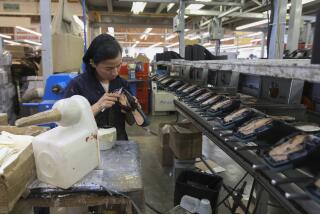Hills Rips Japan for Not Buying More U.S. Chips : Trade: Foreign semiconductors captured only 14.4% of the market in Japan, far below the 20% target that was established last year, the U.S. official says.
- Share via
WASHINGTON — U.S. Trade Representative Carla Anderson Hills chastised Japan on Monday for failing to increase its use of American-made semiconductors under an agreement between the two countries.
Foreign semiconductors captured only 14.4% of the market in Japan, far below the 20% target established last year for imports of the vital computer components.
“It is critical that the Japanese government and industry intensify their efforts to improve access to their semiconductor market over the coming months,” Hills said.
She issued her blunt criticism of Japan on the same day her office released its annual report on trade barriers by foreign countries.
The report showed that, despite rising U.S. pressures, Japan maintains trade barriers that exclude billions of dollars worth of American products, from commodities--such as rice, animal feed grains and lumber--to high-technology goods such as semiconductors. South Korea, meanwhile, restricts imports of America’s beef, fruits and grains, as well as television commercials and trucking firms, the report said.
America’s trading partners complained earlier this month at a Geneva meeting of the General Agreement on Tariffs and Trade that the Bush Administration too was taking an increasingly protectionist stance in world commerce.
But U.S. exports have been climbing dramatically, and the U.S. is now the world’s biggest exporter, having surpassed Germany, Hills noted Monday. Foreign sales jumped to $421.6 billion last year, up from $322.4 billion in 1988, and accounted for much of the nation’s economic growth during that period, she said.
“Because of the Bush Administration’s success in removing foreign trade barriers, far more foreign markets are open today to U.S. firms than three years ago,” Hills asserted in a statement accompanying the 267-page study.
But the report, the National Trade Estimate on Foreign Trade Barriers, “shows that much more remains to be done,” she said.
The volume is a report card on the performance of countries trading with the United States. It does not recommend any specific actions or retaliation against other countries.
Trade issues are complex and sophisticated, requiring detailed negotiations to get foreign countries to alter their traditional patterns of excluding outsiders. For example, many of the fastest-growing American firms are in service industries, from advertising to finance. And some of the most profitable merchandise includes films and computer software--items easily copied and sold illegally unless the importing country has strong laws providing copyright protection.
“U.S. goods can penetrate any markets if given an equal footing and a fair shot,” Gary Edson, the trade representative’s general counsel, told a news conference on the report.
The Trade Representative’s Office issues reports quarterly on the progress of the agreement aimed at opening Japan’s computer market to foreign semiconductors. Monday’s announcement of a 14.4% share for the final quarter of 1991 represented a negligible gain over 14.3% in the prior three months.
The Japanese government says a general economic slowdown is inhibiting import growth.
More to Read
Inside the business of entertainment
The Wide Shot brings you news, analysis and insights on everything from streaming wars to production — and what it all means for the future.
You may occasionally receive promotional content from the Los Angeles Times.










